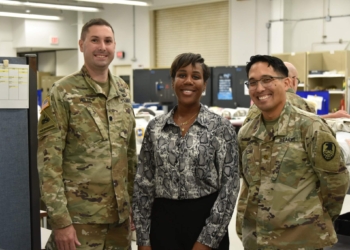Mothers in the Air Force’s explosive ordnance disposal (EOD) career field may soon have physical fitness test standards that take into account their changing and recovering bodies.
The Air Force Installation and Mission Support Center (AFIMSC) crafted revision recommendations for the Air Force’s Tier 2 Physical Fitness Test policy, a test specifically designed for more physically demanding fields like EOD. The test, unlike the Tier 1 test, is independent of age and gender. Though the revision process officially began in 2015, the needs of pregnant and postpartum women went unnoticed until a senior master sergeant in EOD pointed them out in October 2020.
READ: Marine Corps changes policy to give new moms 1-year break from fitness, weight rules
“During the roll out of the Tier 2, there was concern amongst the EOD females regarding many issues,” Senior Master Sgt. Lindsay Rickert said. “Our EOD career field manager showed true leadership and took the time to do a Zoom call and really listened to everyone’s concerns.”
Women-focused fitness
Rickert was pregnant with her third child at the time. She strongly felt there were missing voices in the revision process.
“I felt women health professionals should be included when writing the Tier 2 policy to create a smart solution that doesn’t hold females back and gives them time where needed to heal after birth,” she said.
AFIMSC was happy to listen and respond, said Master Sgt. John Johnson, a resource analyst for AFIMSC’s Installation Support EOD Program at Joint Base San Antonio in Texas.
“The message that we are sending to our female EOD airmen and potential female EOD recruits [with the policy updates] is that you are a part of our team and we value and care about you,” Johnson said. “Women have been successful EOD technicians since the 1970s, and we want to make sure they are receiving the care they need to have a long successful career without sacrificing their health and family goals.”
Some of those changes include postpartum EOD mothers having a full year to recover before being required to meet the less-difficult Tier 1 standard. Then, each woman would have another six months before the Tier 2 test. That way, Johnson explained, EOD is still demanding high levels of physical fitness but also being sensitive to a mother’s unique needs.
“We are also proposing recommended care guidance be included in the policy, such as new mothers receive pelvic floor physical therapy services and care for anxiety or depression as needed,” Johnson said. “The hope is that this will also educate supervisors and leaders on the significant physiological and mental challenges associated with childbirth.”
Speaking up
The group of EOD women is small; out of approximately 1,200 EOD airmen, only 37 are female. The number of mothers is even smaller ― so Rickert and her mother-coworkers knew they had to speak up when it came to their needs.
“I have known women that have left because of postpartum difficulties,” Rickert said. “I think this is amplified in EOD, because we often have a more demanding mission and there is a smaller number of us. I have had my challenges and contemplated leaving many times, but I love what I do, and so I keep going.”
Johnson and his team do not want any more EOD women to face that hard choice between career and motherhood. To that end, a one-day focus group was held on Jan. 7 at AFIMSC headquarters with six EOD mother-airmen. Lt. Col. Larissa Weir, chief women’s health consultant to the Air Force Surgeon General and a pelvic floor physical therapist, were also in attendance.
“We reviewed current policies and pending legislation, then had presentations from the subject matter experts, followed by development of the future policy,” Johnson said. “The experiences of the working group members was vital to developing a policy that makes sense for the future of all our EOD airmen.”
In January, the AFIMSC team submitted proposed fitness test changes to Air Force headquarters for review. Both Johnson and Rickert are hoping for speedy implementation.
EOD women “are, and will be assets to EOD regardless of sex or motherhood, and as such, we want to provide them with tools to be successful,” Rickert said. “Hopefully this policy will make them feel more comfortable with joining the EOD family.”
Read comments













































